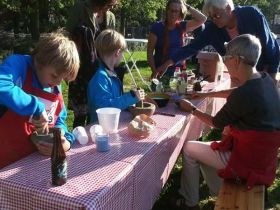
SHORT DESCRIPTION: In 2013, Jessica Zwartjes and Marijtje Mulder took the initiative to start Het Zoete Land in the Leiden area in the Netherlands. Partly as a way to restore nature (indirectly through educating people about eating/ growing organic food), partly as a way to start working towards a food policy. It is a not-for-profit association and is an activity of Stichting Leiden Oogst which is a legal foundation. The garden has a multifunctional purpose including activities like social care, education, subsistence production, leisure and environmental benefits. Het Zoete Land aims to become an attractive place where people enjoy coming on foot, by bike or by boat. The place will offer a pick-your-own garden, a tearoom, natural play area for kids and walking routes
KEY ACTIVITIES: The production area is 3200 m2 in the open air and they are planning for a 75m2 greenhouse. They grow a variety of products organically: more than 25 different vegetables, herbs and flowers (ranging from coloured carrots, haricots verts, sweetcorn, coriander, chervil and edible flowers like nasturtium and cornflowers) and a variety of small fruits (like red currants, blueberries, white and black berries, gooseberries and raspberries). People can donate to the foundation in order to fully participate inthe garden and are informed on a weekly basis about what can be picked from the garden. Besides production activities, they organise a variety of activities including educational services, community activities, social care services and recreation. The social care services are still informal and unpaid, for two young adults to get some working experience. About once a month, during the growing season, they organise public activities. For example at the opening of the growing season they had cake and tea, made scarecrows with children and gave tours around the garden.
RELEVANT DIMENSION: Organic, CSA, direct marketing, multiple products and services, part-time, community-based, innercity, low-tech
BUSINESS MODELS: Shared economy (social inclusion, participation)